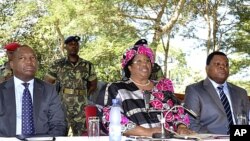Malawi's vice president, Joyce Banda, was sworn in as president Saturday following confirmation that President Bingu wa Mutharika died suddenly on Thursday.
Banda, who becomes Malawi's first female president, ascended to the presidency as mandated by the national constitution. She took the oath of office in the capital, Lilongwe.
The government of Malawi has officially confirmed the death of the country’s president, Bingu wa Mutharika. Addressing a news conference in the capital, Lilongwe, Banda said she is shocked and saddened by President Mutharika’s death.
Government officials said Mutharika suffered a heart attack on April 5 at his state house and was rushed to Kamuzu Central Hospital in Lilongwe.
Banda has said that the funeral arrangements will be announced later upon consultation among the government and members of the family.
“In the meantime I call upon Malawians to remain calm and keep peace in this time of bereavement and further direct that all national flags should be flown at half mast and that Malawi broadcasting corporation should play somber music," she said. "I also ask Malawians that we should mourn the father of this nation with dignity.”
Banda has declared 10 days of mourning. She said she is calling a Cabinet meeting to discuss funeral arrangements. The body of president Mutharika is still in South Africa.
Banda's address was attended by Cabinet ministers, members of parliament, the army commander general, inspector general of police, foreign diplomats and civil rights organizations.
Mutharika was elected president of Malawi in 2004 and won a second term in 2009. He was credited with improving food security in Malawi and, at one time, making his country a political and economic model for other African countries.
But in more recent years, the economy has stumbled and unemployment has been high. Critics of the president say he had become increasingly autocratic. Nineteen people were killed last July in anti-government protests.
An economist by education, Mutharika was a World Bank official and served as a civil servant in Malawi. He was appointed minister of economic planning and development in 2002 and then-President Muluzi nominated him as his successor.
He later broke away from Muluzi and formed the Democratic Progressive Party, which has the majority in parliament.




